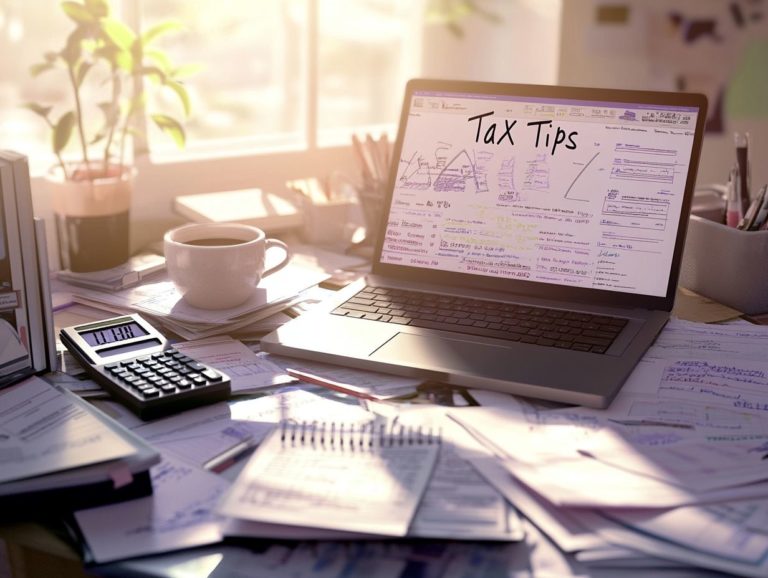How to Estimate Your Taxes as a Freelancer
Navigating the world of freelance work presents a unique set of challenges, particularly when it comes to taxes. Understanding your tax obligations can feel overwhelming, but it doesn t have to be. Get ready! This guide breaks down everything freelancers need to know about taxes, making the process straightforward and stress-free!
This guide distills the essentials for freelancers, covering everything from the types of taxes you need to file and accurately calculating your income, to maximizing your deductions and maintaining meticulous records. Don’t wait until tax season! Act now to ensure you re fully prepared!
Contents
- Key Takeaways:
- Understanding Tax Obligations for Freelancers
- Calculating Income for Tax Purposes
- Deductible Expenses
- Estimating Tax Payments
- Methods for Estimating Taxes
- Quarterly Tax Payments
- Maximizing Tax Deductions
- Keeping Accurate Records
- Frequently Asked Questions
- What is a freelancer and why do I need to estimate my taxes as one?
- What types of taxes do I need to consider as a freelancer?
- How do I calculate my estimated taxes?
- When are estimated taxes due and how do I make payments?
- What happens if I don’t estimate and pay my taxes?
- Can I deduct business expenses from my estimated taxes?
Key Takeaways:

- Estimate your taxes as a freelancer by understanding your tax obligations and identifying sources of income.
- Maximize your tax deductions by keeping accurate records and utilizing recommended tools and strategies.
- Plan for quarterly tax payments and utilize methods for estimating taxes to stay on top of your tax requirements as a freelancer.
Understanding Tax Obligations for Freelancers
Understanding your tax obligations as a freelancer means recognizing the array of responsibilities that come with self-employment, meaning working for yourself. You ll need to navigate the intricacies of tax filing, which includes estimated taxes and annual returns.
It s essential to grasp how net profits and losses influence your overall tax situation. Familiarize yourself with specific forms like Schedule C, a tax form used to report income or loss from a business, and Form 1040, required by the IRS. This knowledge not only helps you comply with your obligations but also allows you to maximize potential deductions.
Types of Taxes and Filing Requirements
As a freelancer, you ll encounter various types of taxes, each with specific filing requirements dictated by the IRS. Self-employment tax should be at the forefront of your mind, as it encompasses both Social Security and Medicare contributions, which can significantly impact your annual returns.
Depending on your business structure and the nature of your income, you may also need to file information returns. If you re operating as a sole proprietor, you ll need to report your income on Schedule C of your Form 1040. If you ve established an LLC, you can choose between partnership or corporation taxation, which will influence how you file. S corporations add another layer of complexity; while they offer the benefit of pass-through taxation, they also come with stricter requirements you must follow.
Each business structure not only affects your tax rate but also necessitates different documentation. It s crucial for you to understand your obligations and maintain accurate records throughout the year to navigate these tax waters successfully.
Calculating Income for Tax Purposes
Calculating income for tax purposes is crucial for freelancers like yourself to accurately assess your income tax liabilities. This process involves identifying both net profit and net loss from various income sources, including gigs that generate 1099 forms.
You must utilize Schedule C to report your income meticulously, ensuring that every dollar earned is accounted for. Doing so will help you avoid any penalties when it comes time to file your taxes.
Identifying Sources of Income
Identifying your sources of income is essential for ensuring compliance with income tax requirements as a freelancer. Common sources include payments for freelance work, often documented through 1099 forms, and income from various clients across the gig economy.
Understanding these income streams is crucial for effective financial management. You may find yourself working with traditional clients who provide ongoing projects, as well as leveraging gig economy platforms for short-term assignments. This variety allows you the flexibility to diversify your revenue.
Maintaining accurate records of all transactions and contracts is vital to sidestep tax issues. Those 1099 forms are key documents that ensure you report income from these varied sources correctly.
Emphasizing proper documentation not only streamlines your tax preparation but also helps you track your earnings over time, making it easier to strategize for your future financial goals.
Deductible Expenses

Understanding deductible expenses is important for freelancers like you. It can significantly reduce your taxable income and lower your overall tax obligations.
Common tax deductions include expenses related to a home office, which can yield substantial savings. Additionally, contributions to retirement accounts like SEP IRA (Simplified Employee Pension) and SIMPLE IRA (Savings Incentive Match Plan for Employees) can also be beneficial. If you operate as a qualified joint venture, you can take advantage of specific deductions tailored to your business structure.
Navigating deductible expenses involves more than just writing off standard costs. It’s essential to carefully keep track of every expense incurred in your work, whether through detailed receipts or organized digital files.
Expenses such as equipment, software subscriptions, and travel costs can accumulate, contributing to your overall savings. Notably, the implications of a home office deduction enable you to claim not only a portion of your living space but also related utilities and internet expenses.
Contributions to retirement accounts secure your future and provide valuable tax relief. Engaging in strategic financial planning can ultimately lead to a healthier bottom line for you as an independent worker.
Estimating Tax Payments
Estimating tax payments is an essential practice for freelancers to manage their tax obligations effectively. This process involves calculating estimated taxes based on projected income, allowing you to break them down into quarterly payments.
This strategy helps you avoid the shock of a hefty tax bill at year-end. Working with a tax professional can offer invaluable insights into accurate estimation methods and assist you in navigating the complexities of income tax calculations. Additionally, consider maximizing deductions to optimize your financial situation.
Methods for Estimating Taxes
As a freelancer, you have various methods for estimating taxes, which are crucial for effective budgeting and managing cash flow. Typically, these methods involve calculating your estimated taxes based on past income and applying those figures to your quarterly payments.
It often pays off to consult a tax professional who can provide personalized advice tailored to your unique financial situation. By utilizing your historical income data, you can generate more accurate projections that account for fluctuations in earnings, minimizing the risk of underpayment penalties. Additionally, being aware of the top tax mistakes freelancers make can further safeguard your finances.
Additionally, understanding the allowable deductions and credits is crucial, as they can significantly influence your tax obligations. By combining self-assessment with expert guidance, you ll pave the way for a more informed and efficient tax strategy.
Quarterly Tax Payments
Quarterly tax payments are an important part of your tax filing journey as a freelancer. These payments are designed to ensure you meet your estimated tax obligations throughout the year.
The IRS mandates that these payments be made on specific due dates to avoid penalties. Make sure you stay on top of these deadlines typically April 15, June 15, September 15, and January 15 of the following year to dodge costly penalties!
For self-employed individuals like yourself, grasping these due dates is vital to avoid unnecessary fines and accruing interest. Neglecting to make these payments can result in significant repercussions, including underpayment penalties that can escalate rapidly.
To determine these estimated payments, you’ll need to project your income and deductions, using last year’s tax return as a helpful reference.
There are numerous tools and resources available to guide you through this process, empowering you to manage your tax liabilities effectively and maintain your financial well-being throughout the year.
Maximizing Tax Deductions
Maximizing tax deductions is a key strategy for freelancers seeking to reduce their taxable income and enhance their financial outcomes. Common deductions encompass expenses associated with a home office, contributions to qualified joint ventures, and a range of business-related costs that are frequently overlooked.
By being mindful of these deductions, you can make a substantial difference in your financial landscape.
Common Deductions for Freelancers

Common deductions for freelancers can significantly enhance your tax savings. This includes important expenses like home office deductions and various costs tied to your chosen business structure. Understanding these deductions is crucial. It helps with effective tax planning and compliance.
By strategically leveraging these deductions, you can substantially reduce your taxable income. For example, the home office deduction allows you to deduct a portion of your rent or mortgage, utilities, and internet costs based on the space you use exclusively for business. This deduction is especially important for sole proprietors working from home.
Don’t forget! You can also deduct expenses related to business supplies, travel for client meetings, and even professional development courses. Recognizing applicable deductions can lower your tax liabilities and support your financial well-being throughout the year.
Keeping Accurate Records
Maintaining precise records is essential for you as a freelancer. It helps you effectively manage your finances and deftly navigate the intricacies of tax filing. Thoughtful record keeping not only organizes your income, expenses, and deductions but also ensures compliance with IRS regulations.
This diligence can significantly simplify the process when it comes time for your annual returns.
Importance of Record Keeping
The significance of record keeping in freelancing can’t be emphasized enough. It directly impacts your ability to file accurately and claim essential tax deductions. Proper documentation ensures you remain compliant with IRS regulations. It also provides a clear financial overview, which is invaluable when tax season rolls around.
For freelancers like you, maintaining organized and comprehensive records can make a world of difference, especially as tax filing deadlines loom. If you’re not diligent with your record keeping, you risk missing out on potential deductions or making inaccuracies in reporting income, which can lead to penalties or even audits.
Consider adopting these best practices:
- Use accounting software to efficiently track your expenses and income.
- Categorize your receipts for easy access.
- Keep detailed notes of all business-related costs.
Establishing a consistent schedule for updating your records can streamline the process. This makes compliance a breeze and greatly reduces stress during tax season. Remember, staying ahead of these responsibilities not only simplifies your tax filings but also lays the groundwork for a healthier financial future.
Recommended Tools and Strategies
Utilizing recommended tools and strategies can significantly enhance your record-keeping capabilities. This ensures your finances are organized and compliant with tax obligations. Online learning tools and expense tracking apps can streamline the process, making it easier for you to maintain accurate and up-to-date records.
By embracing technology, you can leverage cloud-based accounting software like QuickBooks or FreshBooks. These tools automate invoicing and effortlessly categorize expenses. Using such platforms provides you with real-time insights into your financial health, giving you the power to make informed decisions. Integrating tools like Google Drive or Dropbox for document storage allows for easy access and secure backups of essential financial documents.
Regularly updating your records, along with setting reminders for important due dates, can help you avoid late fees and stay on top of your obligations. This approach ultimately leads to a more organized and stress-free work environment, allowing you to focus on what you do best.
Frequently Asked Questions
What is a freelancer and why do I need to estimate my taxes as one?

A freelancer works independently and provides services to clients on a project basis. Unlike traditional employees, freelancers must pay their own taxes. Estimating your taxes is vital to avoiding surprises when tax season arrives.
What types of taxes do I need to consider as a freelancer?
As a freelancer, you need to pay self-employment tax, which covers your Social Security and Medicare. You also have to account for federal income tax and possibly state and local taxes based on your location.
How do I calculate my estimated taxes?
The simplest way to estimate your taxes is to use Form 1040-ES, designed for those with self-employment income. This form helps you calculate your expected tax liability and how much to pay each quarter.
When are estimated taxes due and how do I make payments?
Estimated taxes are due on April 15, June 15, September 15, and January 15 of the following year. You can pay online, by phone, or by mailing a check to the IRS. Paying on time is crucial to dodge costly penalties!
What happens if I don’t estimate and pay my taxes?
Failing to estimate and pay your taxes can lead to penalties and interest from the IRS. These charges can accumulate quickly, so stay proactive with your estimated taxes. Consulting a tax professional can also provide valuable guidance.
Can I deduct business expenses from my estimated taxes?
Yes, you can deduct business expenses from your income when estimating your taxes. This includes office supplies, travel, and equipment used for your freelance work. Be sure to keep accurate records and only deduct necessary expenses related to your business.






